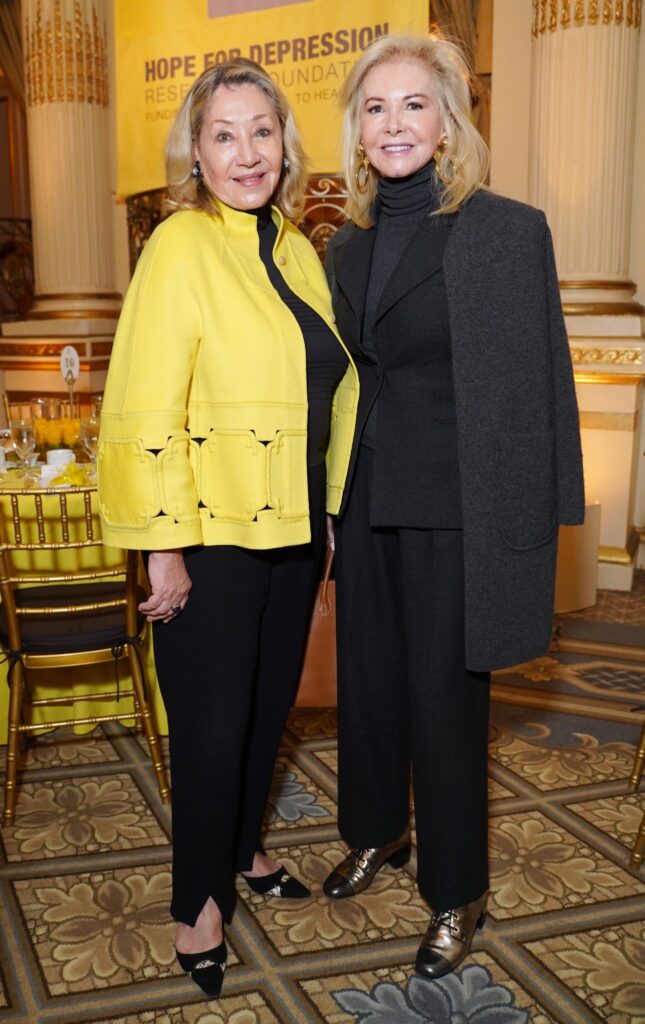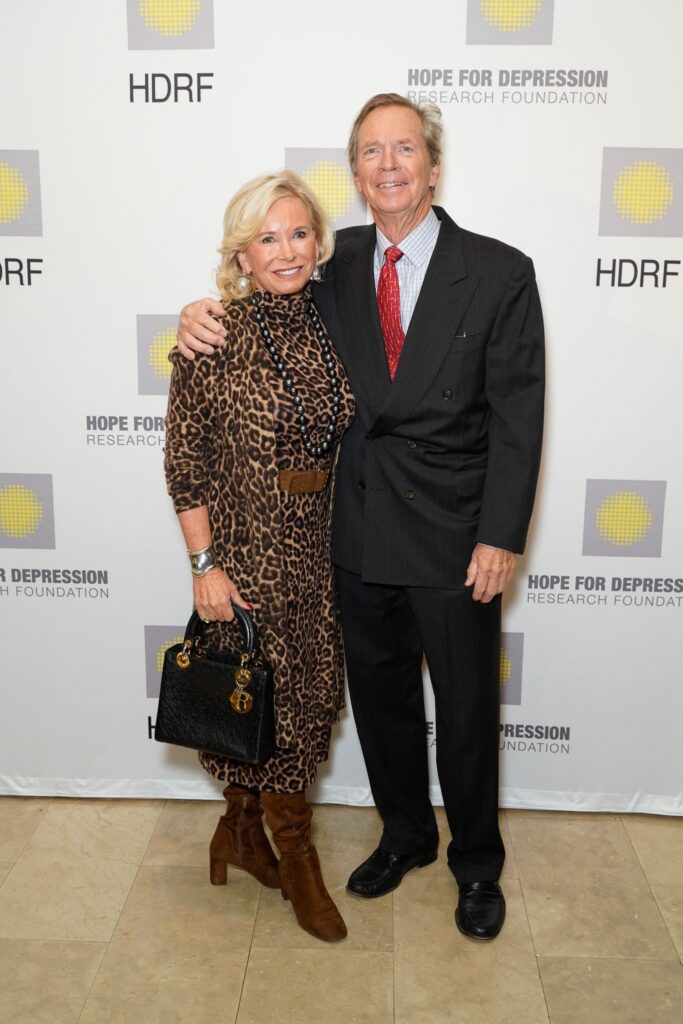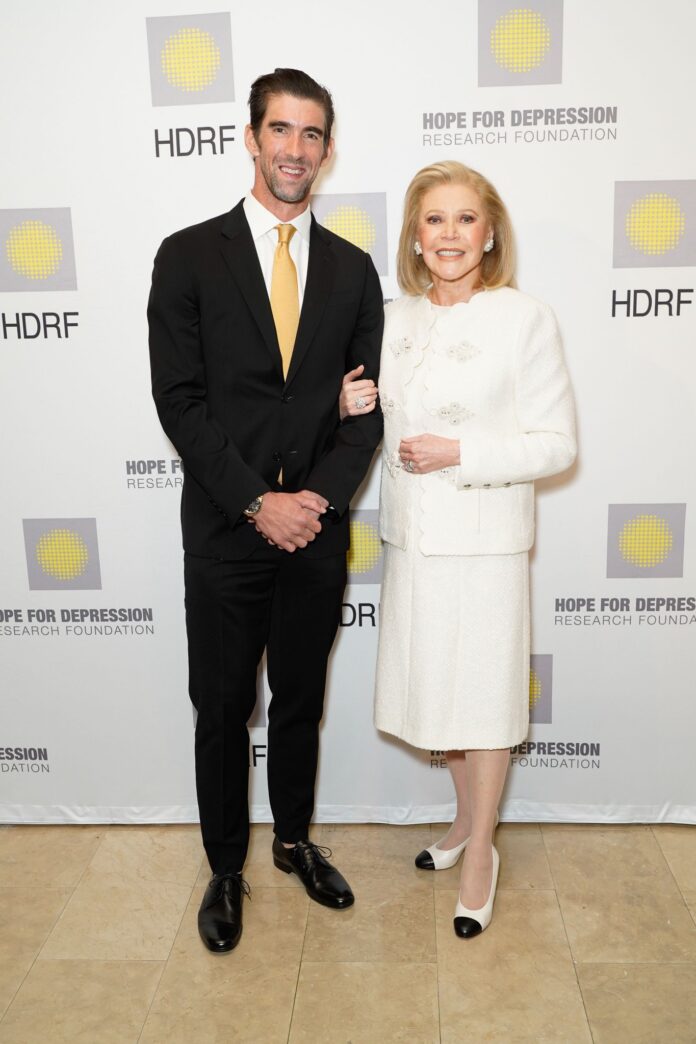The country’s leading non-profit dedicated to advanced depression research, Hope for Depression Research Foundation (HDRF), held its 15th annual HOPE luncheon seminar at The Plaza Hotel on November 10th. The seminar focused on “The Importance of the Gut Microbiome For Your Mental Health” and research highlights from the HDRF’s renowned Depression Task Force. The event drew over 280 guests and raised over $750,000 for life-saving mental health research.

The day concluded with a moving award ceremony, where 23-time Gold Medalist Michael Phelps received the 2021 HOPE Award for Depression Advocacy and Owner of the Indianapolis Colts, Jim Irsay, received the Community Ambassador of Hope Award. Findlay Galleries, represented by CEO James Borynack and COO Adolfo Zaralegui, received the HOPE Corporate Visionary Award.
Master of Ceremonies, Chuck Scarborough began the event by welcoming everyone and speaking about the pressures society has faced during the pandemic and lockdown over the past 18 months. He then took the audience back to 2006, the year HDRF was founded, covering major headlines and happenings of the day, such as the growth of Facebook. He also mentioned that in 2006, depression was severely stigmatized and research into new treatments was stalled. He stated, “It seemed there was no hope,” before introducing HDRF Founder and Chair Audrey Gruss.

Gruss then came to the podium to discuss the staggering statistics of depression today and the foundation’s significant accomplishments in its mission to address the epidemic. Depression is the Number One cause of disability worldwide and is at an all-time high across the world in the wake of COVID-19.
Gruss noted the Foundation works on two fronts: 1) to raise awareness educate the public about depression and 2) research into the root causes of depression in the brain and new and better treatments.
n the education front, Gruss spoke about the myriad of topics covered at the annual luncheon seminar over 15 years, from depression and genes, depression and pain, depression in children, depression in men, to depression through the lifecycle. She also highlighted the many celebrities that have appeared at the Foundation’s events to raise awareness, including Lorraine Bracco, Terry Bradshaw, Jane Pauley, Anderson Cooper, Brooke Shields, and Taraji P. Henson, to name a few. Gruss noted another way in which the Foundation raises awareness is through the Hope Fragrance Collection, which gives 100% of the net profits to depression research.
Gruss also pointed to remarkable research progress by the Foundation’s acclaimed Depression Task Force, which she convened in 2010. The DTF has largely defined the entire filed of depression research in the past decade and currently has two potential new categories of medication in clinical trials. Several more potential new treatments are in the pipeline.
Ms. Gruss also poignantly shared that she launched the foundation in 2006 in honor of her mother, Hope, who struggled with depression. She watched her mother endure treatment by trial and error, hospitalizations, and the life-sapping loss of energy that is the mark of major depression. Conventional medications for depression, she said, have not changed in over 35 years and are not fully effective in 50% of patients. Furthermore, these medications are all based on the same formula as the first SSRI, Prozac, introduced in 1985. Gruss said HDRF is determined to change that by discovering new targets for treatment in the brain.
HDRF Executive Director Louisa Benton took the floor to speak about how the Hope for Depression Research Foundation has built national awareness, even despite the pandemic. She highlighted the Foundation’s Race of Hope, a 5K Run/Walk in Palm Beach, FL in the winter and Southampton, NY in the summer. During the pandemic both races went virtual, an adaptation that allowed thousands of runners from all over the nation to participate. Even as the race of Hope returns to in-person events, HDRF will host a Nationwide Virtual Race of Hope in May as part of the mental health awareness month celebration. Benton also spoke about the New Treatment Initiative (NTI), whereby HDRF has awarded four “Defeating Depression Awards” to promising new treatments for depression in development at universities across the country.
Dr. Helen Mayberg, a member of the Depression Task Force, then came on stage to give the audience an update on important research progress. Mayberg is a pioneer in deep brain stimulation, a surgical intervention for severe, resistant depression. She is currently the founding director of the Center for Circuit Therapeutics at Mount Sinai School of Medicine. Her work has helped the Depression Task Force identify brain circuits in depression.
The medical keynote speaker, Dr. Conor Liston, Associate Professor of Neuroscience and Psychiatry at the Brain and Mind Institute at Weill Cornell Medicine, delivered a presentation about the importance of the gut microbiome to our mental health. Every human has a second brain, he said, called the enteric nervous system, consisting of 100 million neurons embedded in the walls of our digestive tract. There, too, live trillions upon trillions of bacteria of different species known as the microbiome. These microbes play a role not only in intestinal health, but also, it has been recently discovered, in psychiatric health, including our risk of developing depression. Liston’s own research studies have significantly moved this new branch of science forward.
Findlay Galleries, represented by CEO James R. Borynack and COO Adolfo Zaralegui, accepted the 2021 Hope Corporate Visionary Award, established by HDRF to honor corporations that demonstrate exceptional creativity, advocacy, and vision to promote the mental health of our communities. Findlay Galleries is one of the nation’s oldest art galleries, with branches in New York and Palm Beach, and they are a longtime supporter of HDRF and other mental health non-profits. Borynack stated, “The Hope for Depression Research Foundation’s outstanding work and extraordinary accomplishments, year in and year out, keep us focused on our community support.”
Owner of the Indianapolis Colts, Jim Irsay accepted the Community Ambassador of Hope Award. Irsay and the Colts Community created the “Kicking the Stigma” campaign to make it safe to talk about mental illness, and to expand mental health treatment services throughout their Indianapolis community. Irsay stated, “When life doesn’t make sense anymore and you don’t have hope and you don’t want to live, it’s a tough place to be.” He continued, “It’s an illness, and it’s been stigmatized, and that’s the reason we started “Kicking the the Stigma.” People who are sick are afraid to speak up, and they don’t want to seek help.”
Audrey Gruss then presented Michael Phelps with the HOPE Award for Depression Advocacy.
“And now it’s time for the GOAT,” she said, using the acronym for Greatest of All Time. “While no man could touch him in the water, outside of the pool he relentlessly battled with the demons of depression and anxiety. He has used his fame as a platform to be open about his experience with depression and to spread hope and understanding.”
Phelps took the stage to speak in a Q&A with Gruss about his struggles with depression.
When asked about his first moment of depression, Phelps stated, “In 2004 I won eight total medals, six gold and two bronze, and coming back from that is when I first noticed a depression spell.”
He continued: “2014 — that was where I found myself not wanting to be alive.” He went on to speak about entering into a treatment center after hitting rock bottom and feeling it was one of the scariest places he has ever been. He noted that ultimately those 45-days helped him to better understand himself and continuing in therapy is why he was able to stand on the stage today.
Gruss then asked about other athletes such as Simone Biles and Naomi Osaka coming forward about their own experience with depression. Phelps stated, “What Naomi Osaka did on her own platform, in her own words and telling her own story… wow. We can all learn some things from her.” He continued, “All of these athletes and celebrities, these human beings that have stepped up and shared their experience about mental health have been able to save lives.”
When speaking about The Michael Phelps Foundation IM program he stated, “I want to give every kid the chance to accomplish their goals or their dreams, no matter how easy or hard it is to get there. It wasn’t easy getting to where I was and it sure wasn’t easy getting back in 2016 with the journey, but it was a dream nobody else was going to stand in front of.” The audience burst into laughter when Phelps noted, “I had people doubting me my whole life. I had a teacher in sixth grade telling me I would never amount to anything… thanks.”
The Q&A concluded with Phelps responding to a question about his work with Talkspace and helping people receive talk therapy. He noted, “I can make the joke now that I learned to communicate at the age of 30, but at least I got there. I am just trying to spread that message, as it’s something so simple, but something so helpful just to be able to open up and share.”
Each year, the HOPE Luncheon Seminar is held at the Plaza Hotel in New York City and is attended by over 300 top New York philanthropists, asset managers, business and media professionals, socialites and celebrities who gather to raise awareness about depression and its related mood disorders as well as funds for continued research.
The Luncheon Seminar Co-chairs were: Sharon Bush, Jamee and Peter Gregory, Susan Gutfreund, Maru Hagerty, Kim Heirston, Tania Higgins, Eleanora Kennedy, Susan R. McCaw, Kitty and Bill McKnight, Peter S. Paine III, Liz Peek, Nancy Silverman, Barbara and Randall Smith, Scott Snyder and Felicia Taylor.
Additional guests included: James Aman, Krista Bard, Janna Bullock, Joanna Goldenstein, Martin Gruss, Christine Mack, John Meeks, Margo Nederlander, John Paulson, Marc Rosen, Dr. Steven Roose, Hilary Geary Ross, Lis Waterman, Veronica Webb and Lynne Wheat.D

